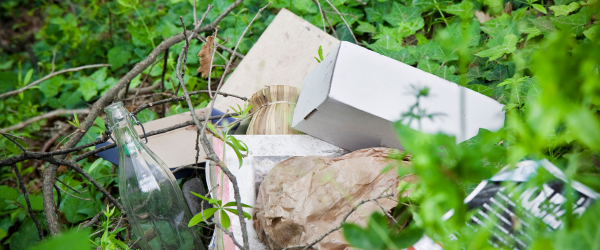Abandoned Garbage and Illegal Dumping
Deliberately abandoned or dumped waste on public or private property is considered illegal dumping.
Illegal dumping is harmful to the environment and costs taxpayers each year with financial and human resources being unnecessarily redirected from other community priorities.
All residents and businesses are responsible for properly disposing of their waste.
Report Illegal Dumping
Help us keep your neighbourhood clean and safe by properly reporting all incidents of abandoned garbage or witnessed illegal dumping. Please email a photo with the date, time and location to dumping@sooke.ca. Where there are identifiable attributes or witness dumping, persons can be fined under District Bylaws.
Mitigation
The District aims to mitigate illegal dumping through the following:
- Signage providing public education on related bylaws and fines;
- Funding to non-profit associations to conduct clean-up events in public spaces;
- Fire Smart Community Clean-up/Stewardship events (coming soon!); and
- A webpage on illegal dumping that provides information on how to reduce illegal dumping and abandonment.
Roles in Solid Waste Management
BC Ministry of Environment
- Regulates municipal solid waste management through the Environmental Management Act.
- Establishes provincial targets for management of solid waste in B.C.
- Approves regional solid waste management plans.
- Authorizes discharges to the environment through permits and operational certificates.
- Enforces provincial regulations and the conditions set out in discharge permits and operational certificates.
- The Report All Poachers and Polluters (RAPP) hotline is available to report wildlife-human interactions where public safety may be at risk. The RAPP program is a toll free tip line and online service that also allows you to report known or suspected violations of fisheries, wildlife, or environmental protection laws.
Capital Regional District
- Operates the Hartland Landfill site and the Port Renfrew transfer station.
- Provides residential recycling services through a combination of curbside and depot collection (through a contract with Recycle BC).
- Prepares the regional solid waste management plan (SWMP).
- Works with municipalities and First Nations to implement the SWMP.
- Regulates the operation of composting facilities through the Compost Facility Bylaw
- Reports annual MSW disposal rate to ministry.
- Provides education and outreach.
- Monitors the implementation of the SWMP through the Solid Waste Advisory Committee.
District of Sooke
- Streetscape sanitation and waste collection services for public spaces including transit stops.
- Municipal waste managing planning.
- Education and outreach associated with local solid waste services.
- Liaises with the regional district with regards to solid waste services and issues.
Private sector involved in waste management (e.g., haulers, facility operators)
- Provides garbage and recycling collection services to municipalities, businesses, residents, institutions, and construction/ demolition projects.
- May operate private facilities such as bottle depots, recycling depots, transfer stations and composting facilities.
- May be regulated by Provincial government.
- Liaises with waste generators (customers) to minimize contamination of waste streams.
- Complies with CRD requirements for source separation of controlled waste.
Waste generators (residents and businesses)
- Participates in municipal and regional solid waste management programs and services; supports compliance for the benefit of households and the greater community alike.
- Is informed regarding source separation requirements, disposal restrictions and options to minimize waste sent to disposal.
Non-profit organizations
- May organization waste collection events (funding potentially available to the District of Sooke Community grant program)
For more on local waste management supplies and resources, visit:
